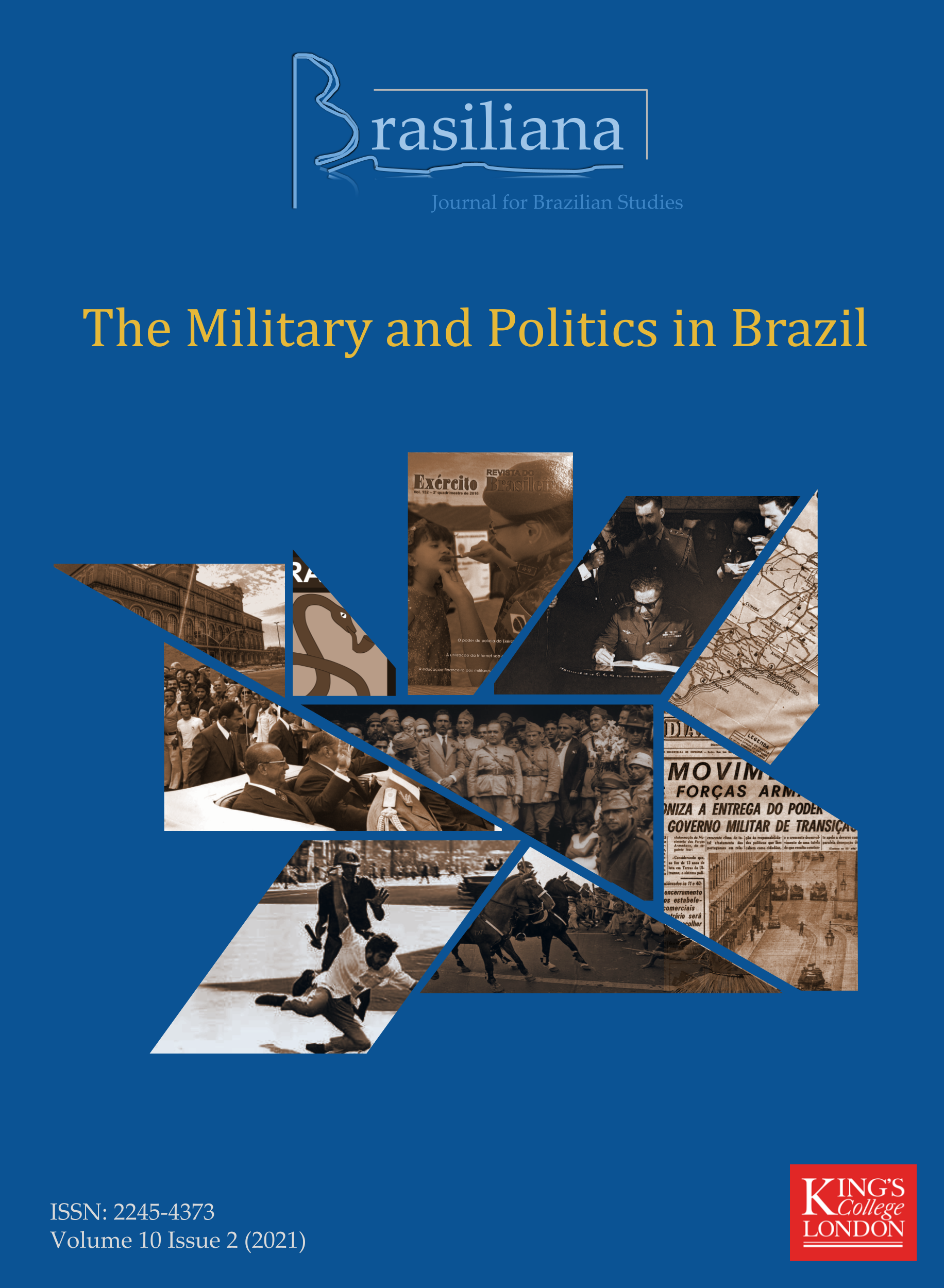The Military as a Moderating Power: a study with Bolsonaro supporters in São Paulo
Main Article Content
Abstract
The election of far-right politician Jair Bolsonaro as president in 2018 marked the end of the two-party (PT and PSDB) dominance in presidential elections since 1994 and the return of a self-declared right-wing politician to power, which had not occurred since the end of the military dictatorship in 1985. In the city of São Paulo, a region that stretches from the beginning of its East Zone towards the North Zone, had been identified as a stronghold for the conservative right-wing vote (Pierucci, 1999) in the 1985 mayoral elections and 1986 governor elections. While this trend disappeared in subsequent elections with the lack of competitive conservative right-wing candidates, this region returned as a main area of support for Bolsonaro in São Paulo for the 2018 presidential elections. This research returned to this region and sought to understand the views of this electorate and what their motivations to vote for Bolsonaro were. For this purpose, semi-structured interviews were conducted with voters who canvassed for Bolsonaro in the 2018 elections, and who are residents in the aforementioned region, as well as ethnographic observations from right-wing demonstrations, which were performed to recruit interviewees and to learn more about their agenda. This presentation discusses some of the findings of this research, in particular the role of the military in the view of these interviewees. Overall, they see the military regime period as positive; associating it with virtues such as “order”, “discipline”, “honesty”; and attribute to the armed forces a sort of “moderating power”, which means that, in their view, they can – and should – interfere in politics if the situation demands it, even at the cost of democratic institutions.
Article Details
![]()
Articles published in Brasiliana are licensed under a Creative Commons Attribution-NonCommercial-NoDerivs 3.0 Unported License.
When publishing open access, the author signs an author publishing agreement in which they retain copyright and give Brasiliana the right to publish the article. Our Open Access publications are distributed under the terms of the Creative Commons Attribution 4.0 International License, which permits unrestricted use, distribution, and reproduction in any medium, provided the original work is properly cited.
References
CODATO, A.; BOLOGNESI, B. & ROEDER, K. M. ‘A nova direita brasileira: uma análise da dinâmica partidária e eleitoral do campo conservador’ IN: Direita, Volver! O retorno da direita e o ciclo político brasileiro. São Paulo: Fundação Perseu Abramo, 2015.
DE VOLO, L. B & SCHATZ, E. ‘From the inside out: Ethnographic methods in political research’ IN: PS: Political Science & Politics 37.2 (2004): 267-271.
HARRINGTON, B. ‘The social psychology of access in ethnographic research’ IN: Journal of Contemporary Ethnography 32, no. 5 (2003): 592-625.
HOCHSCHILD, A. R. Strangers in their Own Land: Anger and Mourning on the American Right. The New Press, 2016.
LEECH, B. ‘Symposium: Interview Methods in Political Science’ IN: PS: Political Science and Politics 35(4), 2002.
MAINWARING, S.; MENEGUELLO, R. & POWER, T. Partidos conservadores no Brasil contemporâneo: quais são, o que defendem, quais são suas bases. São Paulo: Paz e Terra, 2000.
MATTOSO, C. & BRAGON, R. ‘Bolsonaro amplia presença de militares em 30 órgãos federais’, Folha de S. Paulo, October 14th, 2019 (online) Available at: https://www1.folha.uol.com.br/poder/2019/10/bolsonaro-amplia-presenca-de-militares-em-30-orgaos-federais.shtml. (Accessed: August 29th, 2021).
NORRIS, P. & INGLEHART, R. Cultural Backlash: Trump, Brexit and Authoritarian Populism. Cambridge: Cambridge University Press, 2019.
ORTELLADO, P. & SOLANO, E. ‘Nova direita nas ruas? Uma análise do descompasso entre manifestantes e os convocantes dos protestos antigoverno de 2015’, Dossiê: As Direitas no Brasil, n. 11, ano 7, Fundação Perseu Abramo, 2016.
PACHIRAT, T. ‘Shouts and Murmurs: The Ethnographer’s Potion’, Qualitative and Multi-Method Research Newsletter, APSA, 2009.
PAULINO, M. & JANONI, A. ‘Núcleo duro de apoio a Bolsonaro é de 12% da população, aponta Datafolha’, Folha de S. Paulo, September 14th, 2019 (online) Available at: https://www1.folha.uol.com.br/poder/2019/09/nucleo-duro-de-apoio-a-bolsonaro-e-de-12-da-populacao-aponta-datafolha.shtml. (Accessed: August 29th, 2021).
PIERUCCI, A. F. ‘As bases da nova direita’, Novos Estudos – CEBRAP, São Paulo, nº 19, p. 26-45, dez. 1987.
__________. ‘A direita mora do outro lado da cidade’, Paper presented at GT Partidos, Eleições e Problemas Institucionais, XII Encontro Anual de Anpocs, Águas de São Pedro, SP, October 1988.
__________. Ciladas da Diferença. São Paulo: Editora 34, 1999.
ROCHA, C. ‘“Menos Marx, Mais Mises”: Uma Gênese da Nova Direita Brasileira (2006-2018)’ São Paulo: PhD Dissertation defended at Universidade de São Paulo, 2018.
__________. A emergência da nova direita e o bolsonarismo. Seminar presented at Universidade de São Paulo, May 6th, 2019.
SOUSA, M. T. S. R. de. ‘A Trajetória de Jânio Quadros’ IN: LAMOUNIER, B. (org.) 1985: O Voto em São Paulo. São Paulo: IDESP, 1986.
SOUZA, M. do C. C de. ‘A Nova República sobre a espada de Dâmocles’ IN: STEPAN, A. Democratizando o Brasil. São Paulo: Paz e Terra, 1988.

